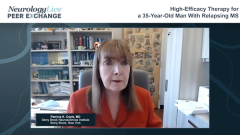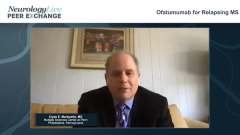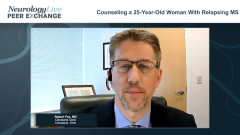
Ofatumumab for Relapsing MS
The rationale for treating patients with relapsing multiple sclerosis with ofatumumab based on data revealed by the ASCLEPIOS I and ASCLEPIOS II trials.
Episodes in this series

Scott D. Newsome, DO, MSCS, FAAN: Because we’re talking about high-efficacy drugs, we’ve had a couple in recent years, some of which Clyde went through. Bob, why don’t you review the new kid on the block within that high-efficacy therapeutic group, ofatumumab? There were some compelling data in the ASCLEPIOS I and ASCLEPIOS II trials about the efficacy. Maybe we can do a deeper dive in terms of who may be a candidate for such a medication during the pandemic.
Robert Fox, MD: Indeed, this is the new kid on the block. This drug was a subcutaneous injection of an anti-CD20 antibody, so think of it like ocrelizumab, but it is a different molecule than ocrelizumab, and it is given by a subcutaneous injection. This was evaluated in a double-blind, placebo-controlled trial. Overall, there were 2 trials done side by side because the FDA prefers to see 2 different trials, and they are often matching trials. A total of 946 patients with relapsing MS [multiple sclerosis] were enrolled in the 2 trials, and they were followed over a 30-month period. Because we’re not using placebo as much anymore, this was an active comparator trial, so it compared the subcutaneous ofatumumab with oral teriflunomide, which is 1 of our standard oral therapies for relapsing MS.
What they found is this: Over the course of the trial, there was a 50% reduction in the annualized relapse rate in the ofatumumab-treated patients compared with teriflunomide, so it was quite a robust reduction. it was not as high as what we have seen with other highly effective drugs, but keep in mind, this was compared with an active drug. We cannot compare the relative reduction in annual relapse rate with a placebo because there was no placebo here. But there was an active drug: oral teriflunomide. There was also a 35% reduction in the probability or the likelihood of disability progression. The reduction in annualized relapse rate translated into a slow disability progression as well. The other secondary outcome measures, T2 lesion, Gd lesion, and serum neurofilament, which is a new blood marker of brain tissue injury. All of them were favorable, although surprisingly, brain atrophy was not slower in the ofatumumab-treated patients compared with teriflunomide. Nonetheless, it was quite a robust data set for a head-to-head comparison of this new drug, subcutaneous ofatumumab—given every 28 days, so every 4 weeks—with oral teriflunomide.
Scott D. Newsome, DO, MSCS, FAAN: Clyde, what do you think of this amid the pandemic? I have my own viewpoints, and I’m happy to share them. If you’re thinking of a high-efficacy drug, would this be a candidate drug that may be preferred over other therapies because it’s subcutaneous and can be taken at home? There’s a lot of conversation around that because of the coronavirus pandemic.
Clyde E. Markowitz, MD: When we first entered into the world of the pandemic in March 2020, we all were concerned about where our patients would end up in this pandemic and whether we should continue with ocrelizumab. Ofatumumab was not yet available, and this came at the right time, in essence, because patients did not want to come to the hospital because the hospitals were inundated with patients who were very sick, and they had a concern. Most of the patients were coming to get their ocrelizumab infusions, so this came out at a time when we could offer an option where you could just get it at home, although we started to get ocrelizumab home infusions at the same time as well.
That being said, there is clearly an advantage to being able to do it at home from a patient standpoint where they do not have to come to a hospital. They just do a self-injection: It’s once a month, so it’s pretty convenient. That has been a real benefit, although there’s an accountability and compliance question in that conversation because we know when our patients are coming for their intravenous infusions because we have documentation of exactly when they are getting their infusion. In this setting, we do not know whether they are taking their injections. We rely on the fact that they are going to do that. We have 25 years of experience knowing that people are not so compliant with some of these injectable therapies. I don’t know if we’re going to have a huge issue, but there are advantages to not having to come to the hospital. There are disadvantages in the conversation related to compliance.
With the pandemic, we could probably spend 2 hours talking about whether it’s a good idea to be on an anti-CD20 agent during the pandemic. A lot of us, at least initially, were concerned about this. The questions became whether people are going to develop an adequate immune response, and that’s still a question in our minds: whether immunizing somebody who does not have B cells in their peripheral blood is going to mitigate the likelihood of them developing an adequate immune response. We have some data from the ocrelizumab studies, such as the VELOCE trial, that looked at this for people who are just starting on ocrelizumab, and there were data to suggest that there was going to be a decent response. Maybe we will be OK, but I’m going to leave that as something to be determined. We also know there’s a whole side of this that we don’t have the ability to monitor or measure. There are clearly advantages for us to have a subcutaneous, home-administrated medication during a pandemic.
Scott D. Newsome, DO, MSCS, FAAN: It’s nice to have another option too. Setting the pandemic aside, with patient selection and shared decision-making, there will clearly be people who like the idea of being on a high-efficacy drug but did not like the idea of coming into an infusion enter. In fact, I saw 1 a couple weeks ago, and that is not even about the pandemic. This person was very busy and did not think he could get a whole day off to do the infusion.
Thank you for watching this Neurology Live® Peer Exchange. If you enjoyed the content, and I hope you did, please subscribe to our e-newsletters to receive upcoming Peer Exchanges and other great content right in your inbox.
Transcript Edited for Clarity
Newsletter
Keep your finger on the pulse of neurology—subscribe to NeurologyLive for expert interviews, new data, and breakthrough treatment updates.





























